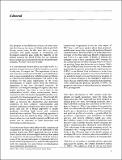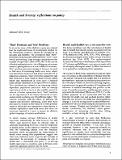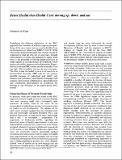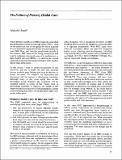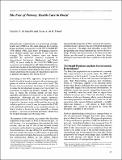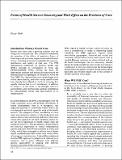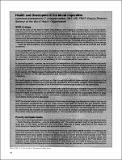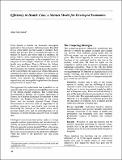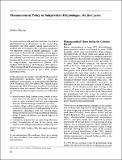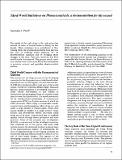Volume 14, Issue 4: Health, Society and Politcs
Browse by
Recent Submissions
-
Editorial
(Institute of Development Studies, 01/10/1983) -
Health and Society: reflections on policy
(Institute of Development Studies, 01/10/1983)SUMMARY Improvements in health among the populations of developed countries have come about largely through improved living standards and public health measures, and the contribution of medicine has been relatively small. ... -
Better Health than Health Care: moving up, down and out
(Institute of Development Studies, 01/10/1983)SUMMARY Promoting health is still widely equated with merely building up the health care system. Health services in Idcs, based on originally imported models, continue above all to benefit the elites, although the PHC ... -
The Politics of Primary Health Care
(Institute of Development Studies, 01/10/1983)SUMMARY All three main elements of the primary health care (PHC) approach — the alleviation of poverty, popular involvement, and health sector reform — involve issues of conflicting social interests, which explain the ... -
The Fate of Primary Health Care in Brazil
(Institute of Development Studies, 01/10/1983)SUMMARY Primary health care programmes have only partially succeeded in redressing the health and health care inequalities suffered by the Brazilian population over the last few decades. In discussing a recent unsuccessful ... -
Forms of Health Service Financing and Their Effect on the Provision of Care
(Institute of Development Studies, 01/10/1983)SUMMARY The successful implementation of primary health care is dependent on financing systems that reflect the wider social, economic and political perspectives on which the concept rests. Particular forms of financing ... -
Health and Development: the Moral Imperative a personal statement
(Institute of Development Studies, 01/10/1983)SUMMARY Public and private health care markets exhibit the same defects: the ‘third party’ (the state or the insurer) pays, and neither the consumer nor the producer has much incentive to economise in the use of scarce ... -
Efficiency in Health Care: a Market Model for Developed Economies
(Institute of Development Studies, 01/10/1983)SUMMARY Public and private health care markets exhibit the same defects: the ‘third party’ (the state or the insurer) pays, and neither the consumer nor the producer has much incentive to economise in the use of scarce ... -
The Chilean Experience with a National Formulary in the 1960s
(Institute of Development Studies, 01/10/1983)SUMMARY The rationalisation of drug use and production in Chile started in the 1940s. However a coherent pharmaceutical policy, meant to counter the negative effects of the marketing policies of the private sector, emerged ... -
Pharmaceutical Policy in Independent Mozambique: the first years
(Institute of Development Studies, 01/10/1983)SUMMARY In the context of developing a comprehensive national health service based on primary health care, major changes have been made in independent Mozambique to the chaotic pharmaceutical situation inherited from the ... -
Third World Initiatives on Pharmaceuticals: a documentation for the record
(Institute of Development Studies, 01/10/1983)SUMMARY The search for rational and equitable pharmaceutical policies has become a worldwide concern in recent years. The Third World countries, particularly through the non?aligned conferences, have played a key role in ...

